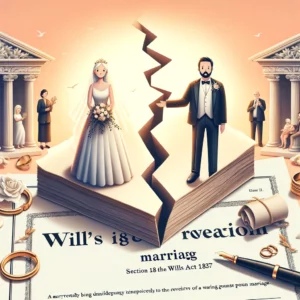Private Family Trust FAQ’s
- Can we put our offspring in to Trust to protect them?
- You can only put in to Trust property that you would freely dispose of, so no, you could not put your offspring in as an asset.
- You can however, have your offspring as beneficiaries so that assets are protected for their benefit.
- Can we put our pets in to Trust?
- Pets are treated as though they are property. They cannot be beneficiaries, but they can be left as property to a Trustee. An allowance can be made for the pet within the Trust.
- Pets are treated as though they are property. They cannot be beneficiaries, but they can be left as property to a Trustee. An allowance can be made for the pet within the Trust.
- Can you use your Common Law name?
- The Trustee holds legal title and needs to be a legal fiction. The Beneficiaries are living souls therefore common names can be used. Do consider that they may need to be identifiable if it is ordered that the names of the beneficiaries are disclosed.
- The Trustee holds legal title and needs to be a legal fiction. The Beneficiaries are living souls therefore common names can be used. Do consider that they may need to be identifiable if it is ordered that the names of the beneficiaries are disclosed.
- Do the names on the Trust need to match the Title Deeds?
- No. Title deeds are a fictional representation of actual tangible property. The title deed will need to be put into the name of a legal fiction as trustee. But the beneficiaries are kept private, and their names do not need to be put on to a title deed.
- No. Title deeds are a fictional representation of actual tangible property. The title deed will need to be put into the name of a legal fiction as trustee. But the beneficiaries are kept private, and their names do not need to be put on to a title deed.
- Can we put our home into a Trust if we have a mortgage?
- Yes, you can put the equity and beneficial use in to Trust. Your bank does not own your property, their asset is the charge they have against the legal title of the property.
- Yes, you can put the equity and beneficial use in to Trust. Your bank does not own your property, their asset is the charge they have against the legal title of the property.
- Can you put a mortgage on a property if it is in Trust?
- Yes, the trustee can apply for this later. The mortgage would need to be through a ‘legal entity
- Yes, the trustee can apply for this later. The mortgage would need to be through a ‘legal entity
- Do you have payment plans?
- Yes, contact us and we can make arrangements. We are also open to equitable renumeration in other forms as well.
- Yes, contact us and we can make arrangements. We are also open to equitable renumeration in other forms as well.
- What if we buy land abroad?
- Trusts Laws differ between countries. It’s advisable to look up the Hague Convention on the Recognition of Trusts Act 1985 to see if the country you are interested in has the same Trusts Law as the UK.
- Trusts Laws differ between countries. It’s advisable to look up the Hague Convention on the Recognition of Trusts Act 1985 to see if the country you are interested in has the same Trusts Law as the UK.
- Does the Trust training get updated?
- Yes, we are always updating and improving the training courses. We are still learning, our mentors are still learning. We cascade that learning down to you.
- Yes, we are always updating and improving the training courses. We are still learning, our mentors are still learning. We cascade that learning down to you.
- Can you convert bank accounts you already have into the Trust?
- Yes, as long as the account is for the use of the Trust only and you keep an audit trail of what is going in and what is going out.
- Yes, as long as the account is for the use of the Trust only and you keep an audit trail of what is going in and what is going out.
- Can trusts be used for smaller things like TV’s and valuables?
- Yes, we always say to list things that are hard to replace or that you would not want to lose to a bailiff.
- Yes, we always say to list things that are hard to replace or that you would not want to lose to a bailiff.
- What about cars?
- The equitable title can be put into trust and the legal title (registered keeper) in the name of a trustee. You would need to know how to enforce the Trust if it is challenged though.
- The equitable title can be put into trust and the legal title (registered keeper) in the name of a trustee. You would need to know how to enforce the Trust if it is challenged though.
- Can you put Cryptocurrency into your asset listing?
- Yes. You can put the wallet or addresses of your cryptocurrency into your asset listing.
- What if you want to sell your Cryptocurrency? The trustee can dispose/liquidate any assets held in trust with the approval of the beneficiaries.
- What is a Secondary Beneficiary?
- The secondary beneficiary would be someone you want to benefit from the Trust, but they don’t get to vote on how the Trust is run unless there are no other primary beneficiaries left.
- They are sometimes termed “remainder” or “hope” beneficiaries.
- Can you put yourself as Primary Beneficiary with 100% share?
- Not if you are a trustee and settlor also, there have to be beneficiaries who are literally trusting the Trustee, otherwise there is no trust.
- If you have someone else as a Trustee, then yes, but it would be a Bare Trust and it is harder to defend against claims.
- It is much stronger when additional beneficiaries are included.
- Can you get alloidial title in the UK?
- No, allodial title is not recognised under English law, and it is not possible to obtain allodial title in the United Kingdom. The concept of allodial title is a legal concept that originated in ancient societies, and it has no legal basis under the common law system that is followed in the United Kingdom.
- Instead, land ownership in the UK is based on the concept of “tenure”, which is a system of rights and obligations that govern the ownership and use of land. The most common form of land ownership in the UK is “freehold” ownership, which gives the owner the right to use, occupy and sell the land subject to certain legal restrictions and obligations, such as paying taxes and complying with planning and environmental regulations.
- Other forms of land ownership in the UK include “leasehold” ownership, which gives the owner the right to use the land for a specified period of time subject to certain conditions and restrictions, and “commonhold” ownership, which is a relatively new form of ownership that allows for the shared ownership of freehold property, such as apartments or townhouses.
- What is a beneficial or equitable title?
- A beneficial or equitable title refers to the right to enjoy or benefit from a property or asset, even though the legal title to that property or asset is held by someone else. In other words, a person who holds a beneficial or equitable title to property has an interest in the property, but does not have legal ownership of the property.
- For example, in a trust arrangement, the trustee holds the legal title to the trust property, but the beneficiaries of the trust hold the beneficial or equitable title to the property. The beneficiaries have the right to receive the income generated by the property or to benefit from its appreciation in value, even though they do not hold legal title to the property.
- Is Trusts Law recognised in Spain?
- Yes, trusts law is recognised in Spain, although trusts are not as widely used in Spain as they are in some other countries. The Spanish legal system has historically relied more on civil law, which is based on written laws and statutes, than on common law, which relies on judicial decisions and legal precedents.
- Trusts are generally considered a common law concept, but in recent years, many countries with civil law systems have adopted legislation to recognise trusts and allow for their use. Spain is one such country that has adopted legislation recognising trusts, which was introduced in 2006 under the Spanish Trust Law (Ley del Fideicomiso).
- Under the Spanish Trust Law, a trust can be established for various purposes, such as to manage assets for the benefit of beneficiaries, to provide for charitable purposes, or to hold assets for a specific purpose. The Spanish Trust Law sets out the requirements for creating a trust, the powers and duties of the trustee, and the rights and obligations of the beneficiaries.
- However, it is important to note that trusts are not commonly used in Spain and may not be as familiar to Spanish legal professionals as they are to legal professionals in common law countries.
- Is Trusts Law recognised in Holland?
- Yes, trusts law is recognised in the Netherlands. The Netherlands has a civil law system, but it has also adopted legislation recognising trusts, which was introduced in 1995 under the Dutch Trusts Act (Wet op het trustkantoor).
- The Dutch Trusts Act regulates the activities of trust offices and provides for the establishment and administration of trusts in the Netherlands. It also sets out the requirements for creating a trust, the duties and powers of trustees, and the rights and obligations of beneficiaries.
- The Dutch Trusts Act distinguishes between two types of trusts: the express trust, which is created by a declaration of trust, and the constructive trust, which arises by operation of law. The Act also provides for the recognition of trusts established under foreign law, subject to certain conditions.
- While trusts are recognised in the Netherlands, they are not as commonly used as in some other countries, such as the UK and the US.
- Can you put a share of a house in to trust?
- Yes, you can put a share of a house into a trust.
- Yes, you can put a share of a house into a trust.
- Are Trusts recognised in New Zealand and Australia?
- Yes, trusts are recognised and widely used in New Zealand. The law governing trusts in New Zealand is primarily based on common law principles, and it has been further clarified and supplemented by statutory provisions, including the Trustee Act 1956 and subsequent amendments.
- Yes, trusts are recognised and widely used in New Zealand. The law governing trusts in New Zealand is primarily based on common law principles, and it has been further clarified and supplemented by statutory provisions, including the Trustee Act 1956 and subsequent amendments.
- What are Common Law Trusts?
- A common law trust, also known as an express trust or a trust created by declaration, is a legal arrangement in which a person or entity (the settlor) transfers assets to another person or entity (the trustee) to hold and manage for the benefit of one or more individuals or organizations (the beneficiaries). The terms and conditions of the trust are set out in a trust instrument, such as a trust deed or agreement.
- In a common law trust, the rights, duties, and powers of the trustee and the beneficiaries, as well as the purposes and administration of the trust, are governed by the common law principles and court decisions. Common law trusts are based on legal principles that have been developed and refined over centuries of English and British legal traditions.
- The settlor establishes the trust by expressing their intention to create a trust, transferring legal ownership of the assets to the trustee, and defining the terms of the trust. The trustee then holds and manages the trust assets in accordance with the settlor’s instructions for the benefit of the beneficiaries. The trustee has a fiduciary duty to act in the best interests of the beneficiaries and to administer the trust assets in accordance with the terms of the trust.
- Common law trusts offer flexibility and are widely used for various purposes, including estate planning, asset protection, charitable giving, and family wealth management. The terms of the trust can be customized to suit the specific objectives and needs of the settlor and the beneficiaries, subject to certain legal requirements and limitations.
- Are Trusts recognised in Canada?
- Yes, trusts are recognized and widely used in Canada. Trust law in Canada is primarily governed by provincial and territorial legislation, as trusts fall under the jurisdiction of property and civil rights laws. Each province and territory in Canada has its own trust legislation, which sets out the rules and requirements for creating and administering trusts.
- In Canada, trusts are commonly used for various purposes, including estate planning, asset protection, charitable giving, and business succession planning. They provide a flexible and effective way to hold and manage assets for the benefit of individuals or organizations. Trusts allow for the separation of legal and beneficial ownership, providing benefits such as asset preservation, tax planning, and control over the distribution of assets.
- It’s important to note that trust laws can vary slightly between provinces and territories, so it’s advisable to consult the specific legislation and seek professional advice when creating or dealing with a trust in Canada.
- Are Trusts recognised in Nova Scotia?
- Yes, Nova Scotia recognizes trusts as a legal concept. Trusts in Nova Scotia are primarily governed by the Nova Scotia Trustee Act, which sets out the rules and principles for the creation, administration, and termination of trusts in the province. Additionally, common law principles and court decisions also play a role in shaping trust law in Nova Scotia.
- The Nova Scotia Trustee Act provides guidance on various aspects of trusts, including the creation of trusts, the duties and powers of trustees, the rights and interests of beneficiaries, and the enforcement and variation of trusts. It establishes the legal framework for establishing and managing trusts in Nova Scotia.
- If you have specific questions or require legal advice regarding trusts in Nova Scotia, it is recommended to consult with a qualified legal professional who specializes in trust law in that jurisdiction.
- What is the Hague Convention on the Recognition of Trusts 1985?
- The Hague Convention on the Recognition of Trusts, also known as the Hague Trust Convention, is an international treaty that aims to provide a framework for the recognition and enforcement of trusts across different jurisdictions. The convention was adopted on July 1, 1985, at the Hague Conference on Private International Law.
- The purpose of the Hague Trust Convention is to promote international cooperation and certainty in relation to trusts. It sets out rules for determining the recognition and validity of trusts, the rights and obligations of trustees and beneficiaries, and the enforcement of trust-related judgments and decisions.
- Key provisions of the Hague Trust Convention include:
- Recognition of trusts: The convention establishes rules for determining whether a particular arrangement qualifies as a trust and should be recognized as such in other participating jurisdictions.
- Choice of law: The convention provides rules for determining the applicable law governing the creation, administration, and validity of trusts, helping to resolve conflicts of law issues that may arise in cross-border trust matters.
- Recognition and enforcement: The convention facilitates the recognition and enforcement of trust-related judgments and decisions in participating jurisdictions, promoting the cross-border effectiveness of trusts.
- Trustee powers and obligations: The convention establishes principles regarding the powers, duties, and liabilities of trustees, ensuring a common understanding of trustee responsibilities across jurisdictions.
- What countries have signed up to the Hague Trust Convention and therefore have the same Trust provisions as the UK?
- The following countries have signed up to the Hague Convention on the Recognition of Trusts:
- Italy (1989)
- Luxembourg (1989)
- Malta (1989)
- Netherlands (1989)
- San Marino (1989)
- United Kingdom (1989)
- Cyprus (1991)
- Israel (1996)
- China, including Hong Kong and Macao Special Administrative Regions (1999)
- South Africa (1999)
- Jersey (2006)
- Switzerland (2007)
- Liechtenstein (2007)
- Australia (2013)
- Japan (2013)
- United States of America (2013)
- New Zealand (2014)
- Canada (2014)
- Russia (2014)
- France (2015)
- Croatia (2017)
- Finland (2019)
- Please note that the status of countries’ participation in international conventions may change over time.
- The following countries have signed up to the Hague Convention on the Recognition of Trusts:












